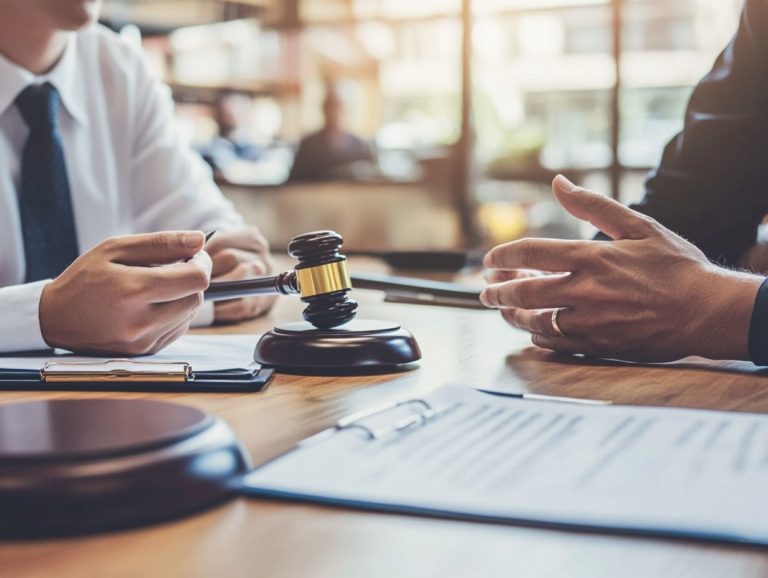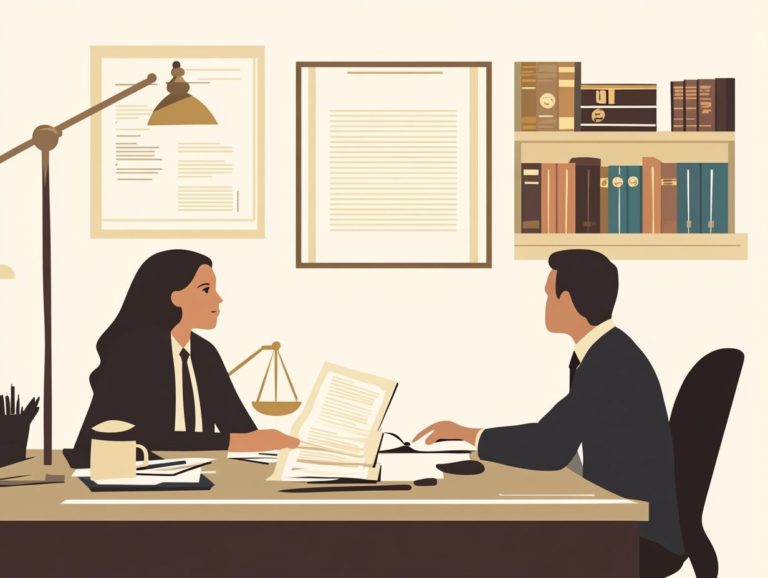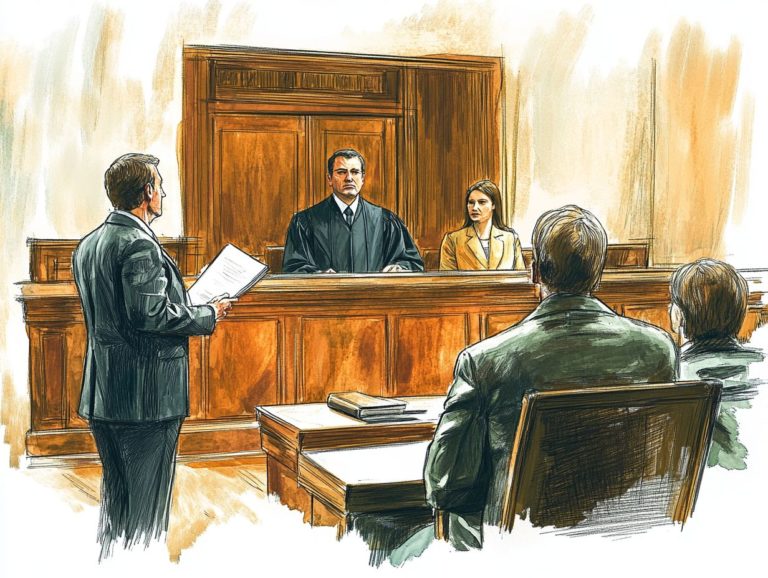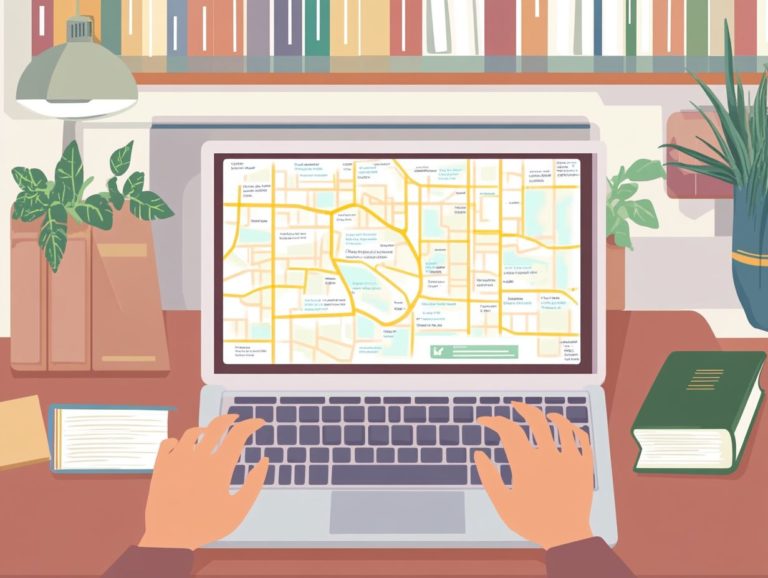Tips for Communicating with Your Defense Attorney
Choosing the right defense attorney is just the beginning of your journey through the complex legal landscape. Once you ve made that pivotal choice, effective communication becomes essential to manage your case with care.
This article serves as your guide, highlighting the critical role of a defense attorney, the importance of clear communication, and how to prepare for your initial meeting.
You ll find valuable insights on maintaining open dialogue throughout your case and strategies for addressing any challenges that may arise.
Delve into this resource to learn how to build a strong attorney-client relationship that can significantly influence your legal experience.
Contents
- Key Takeaways:
- Understanding the Role of a Defense Attorney
- Preparing for Your Initial Meeting
- Effective Communication During Your Case
- Dealing with Challenges in Communication
- Preguntas Frecuentes
- Cu les son algunos consejos para comunicarme efectivamente con mi abogado defensor?
- Con qu frecuencia debo comunicarme con mi abogado defensor?
- Qu debo hacer si tengo nueva informaci n o evidencia para mi abogado defensor?
- Qu pasa si tengo preocupaciones sobre el estilo de comunicaci n de mi abogado defensor?
- Puedo comunicarme con mi abogado defensor por correo electr nico o mensaje de texto?
- Qu debo hacer si tengo problemas para entender los t rminos legales?
Key Takeaways:
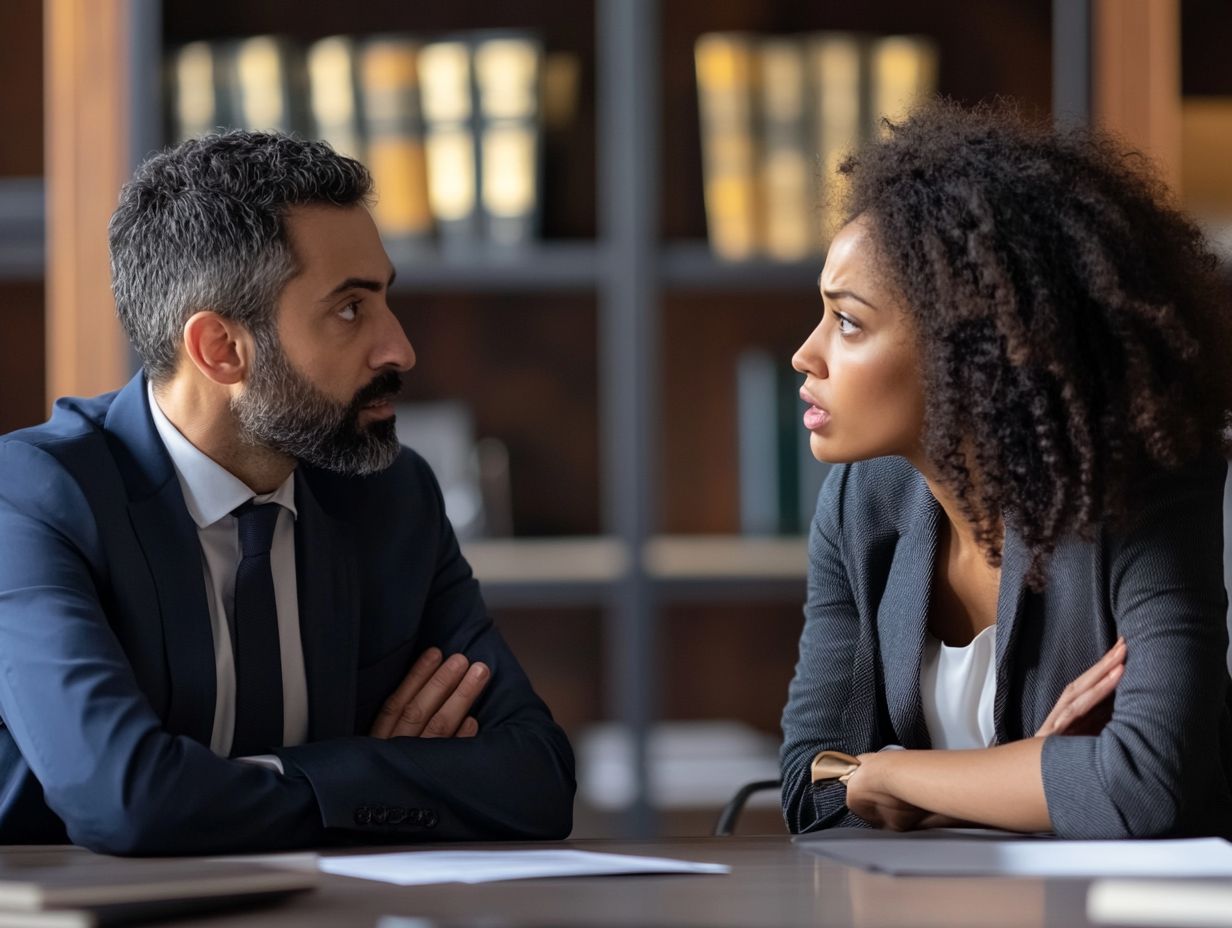
Effective communication is crucial in the attorney-client relationship. It builds trust and ensures a strong defense strategy.
Preparation is key. Gather important documents and questions before your initial meeting.
Active listening and asking questions are vital for effective communication during your case.
Keep your attorney updated and address any misunderstandings or challenges that arise.
Understanding the Role of a Defense Attorney
Understanding the role of a defense attorney is vital for anyone facing criminal charges. These legal professionals are your allies, providing essential guidance and support throughout the legal maze.
A skilled defense attorney does more than just represent you; they create a tailored defense strategy that focuses on the unique aspects of your case. By fostering a solid relationship, they keep you informed about your legal rights and the potential implications of key decisions, such as agreements where you may plead guilty to a lesser charge.
Your journey through the legal process becomes clearer and more manageable with their expertise by your side.
What a Defense Attorney Does
A defense attorney is essential in representing you when you’re accused of criminal offenses. They guide you through every stage of the legal process.
From the initial case review, where they carefully assess evidence and gather relevant facts, to formulating a comprehensive defense strategy tailored to your unique situation, their expertise is invaluable.
Legal counsel ensures that you understand your rights and the potential implications of various plea options. When it s time for court, your attorney will present your defense’s position, cross-examine witnesses, and challenge any inconsistencies in the prosecution’s arguments.
With a deep understanding of the law’s intricacies, they navigate complex legal situations, protecting your interests while striving for the best outcome.
Importance of Communication in the Attorney-Client Relationship
Strong communication is key to a successful partnership with your attorney. It ensures both you and your attorney are aligned on case details and expectations.
This vital aspect allows your attorney to understand your needs and concerns and fosters the trust essential for a productive relationship.
Open dialogue gives you the power to express your thoughts and worries freely, while your attorney clarifies complex legal terms, bridging any gaps in understanding.
However, barriers like emotional stress or a lack of legal knowledge can hinder communication. By implementing strategies such as regular check-ins, using clear language, and creating a comfortable environment, you can significantly improve transparency and clarity.
These efforts strengthen the foundational trust necessary for effective legal representation.
Preparing for Your Initial Meeting
Get ready for your initial meeting your future depends on it! Preparation is crucial for maximizing the effectiveness of your consultation.
To set the stage for productive dialogue, gather essential documents such as legal papers, witness statements, and any updates from previous cases. This preparation allows the attorney to assess your situation thoroughly and develop a preliminary legal strategy.
Arrive with a list of questions to address your concerns and establish clear goals for your case.
Gathering Important Documents and Information
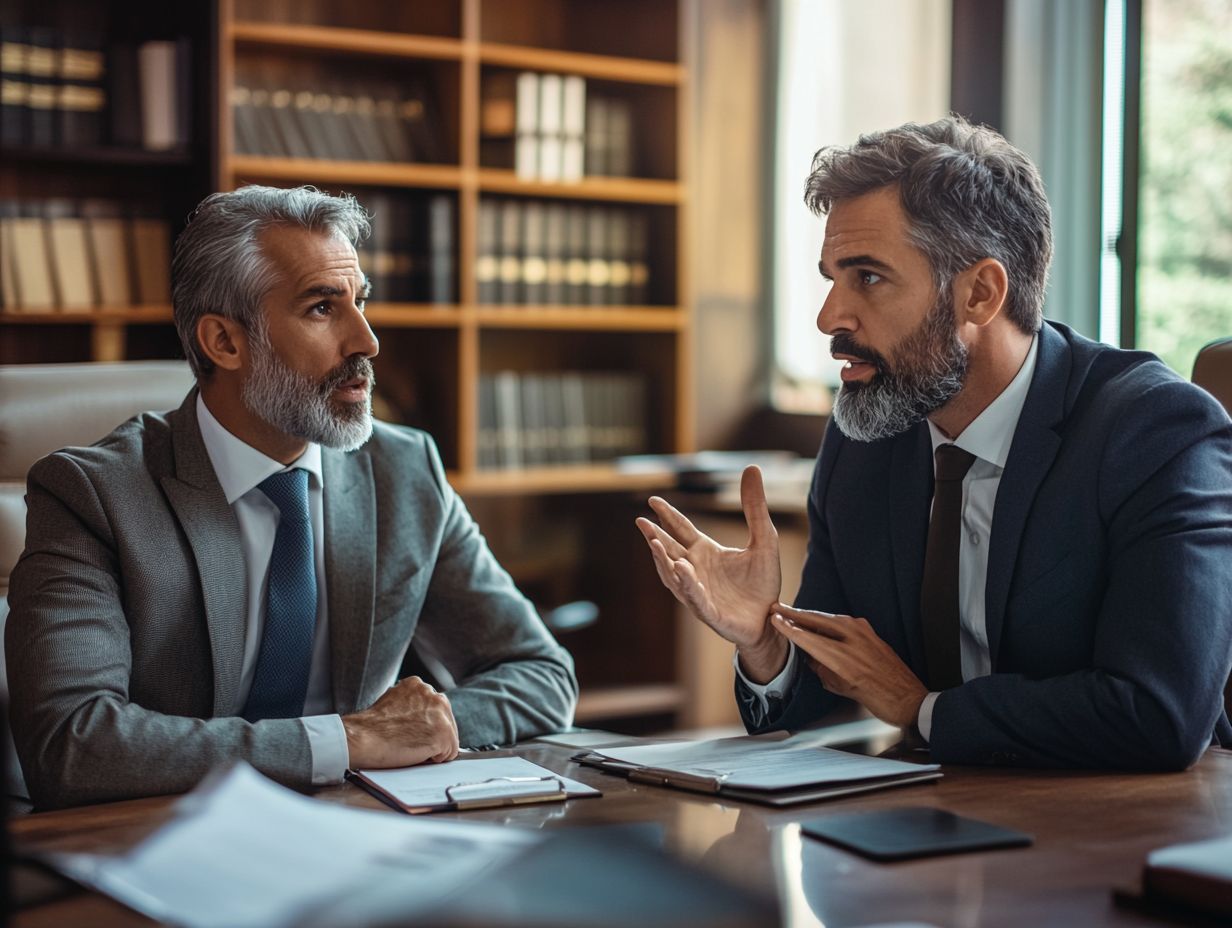
Gathering important documents and information is a crucial step as you prepare for your initial meeting with a defense attorney.
This preparation involves collecting important documents, such as police reports, legal notices, and any previous correspondence related to your case.
By presenting organized information, you enable the attorney to swiftly grasp the details surrounding your criminal charges. The clearer the documentation, the more efficient your discussion will be, helping you understand your legal situation better.
Having these documents readily available aids in identifying key facts, allowing the attorney to strategize effectively for the upcoming legal process.
Questions to Ask Your Attorney
Asking the right questions during your consultation with a defense attorney can significantly enhance your understanding of the legal process and clarify your case goals.
This initial conversation is a pivotal opportunity for you to gain insights into case strategy, potential timelines, and what to expect in the coming months.
Concentrating on vital aspects, such as the overall direction of your case and the defenses available to you, helps align your expectations with the attorney’s expertise.
Establishing a transparent communication channel is essential, allowing both you and your attorney to collaborate effectively toward shared objectives.
Inquiring about past case outcomes and the next steps to take will help create a productive agenda, providing you with reassurance and clarity as the legal proceedings unfold.
Effective Communication During Your Case
Effective communication throughout your case is crucial for ensuring alignment with your defense attorney on strategy and progress.
This means staying informed with timely updates about legal developments and maintaining ongoing dialogue regarding any changes in case details or legal advice.
By establishing a clear communication plan with your attorney, you can streamline this process and minimize the risk of misunderstandings.
Keeping Your Attorney Updated
Keeping your attorney updated with relevant case information is vital for effective legal representation and the formulation of a robust defense strategy.
Regular communication is key! You should feel empowered to reach out whenever there are changes in your personal circumstances or new evidence that could impact your case.
Even updates that may seem minor can offer valuable context, allowing your attorney to adjust their tactics as necessary.
Maintain open lines of communication through scheduled meetings, emails, or phone calls to keep your legal team fully informed and engaged in the process.
Active Listening and Asking Questions
Active listening and asking questions are essential skills you should embrace when interacting with your defense attorney.
Fully engaging in these discussions ensures that you understand the legal advice being provided and empowers you to clarify any uncertainties that might come up.
The insights offered by a defense attorney can often be intricate. By cultivating an environment of open dialogue, you can deepen your comprehension of the legal processes that impact your case.
Asking questions becomes a powerful tool for you to solidify your role in your defense strategy. This back-and-forth communication fosters a collaborative approach, ensuring that every step you take is informed and intentional, ultimately leading to a stronger defense.
Dealing with Challenges in Communication
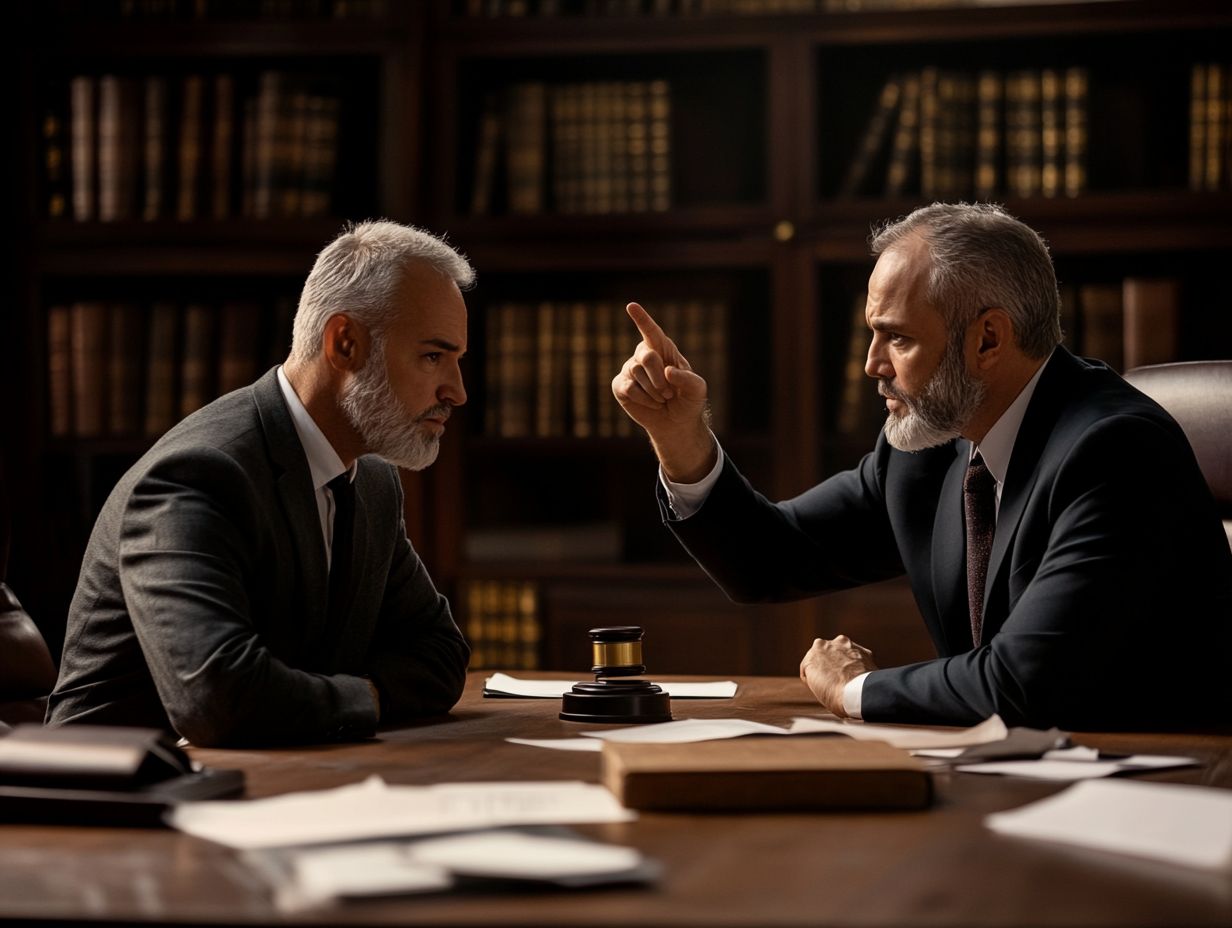
Navigating communication challenges is an unavoidable part of the attorney-client relationship, as misunderstandings can arise from factors like communication barriers or differing expectations.
Tackling these challenges head-on is crucial for preserving a productive professional relationship.
Clients ought to feel empowered to voice their concerns and seek clarity on any confusing points, ensuring that essential communication remains transparent and effective.
Addressing Misunderstandings
Addressing misunderstandings promptly helps prevent escalation and maintain a robust attorney-client relationship. Recognizing potential misinterpretations early allows for smoother dialogue, minimizing complications.
By actively listening and asking open-ended questions, you create an environment where concerns are expressed and discussed openly. Using techniques such as summarizing key points and reflecting back what has been said clarifies intentions and reinforces trust.
Building rapport through empathy enhances mutual understanding and strengthens your partnership. This makes it easier to navigate challenges collaboratively and respectfully.
How to Handle Difficult Conversations
Handling difficult conversations with your defense attorney requires effective communication strategies. Ensure that both you and your attorney feel heard and respected.
Approach these discussions with an open mind and a genuine willingness to understand different perspectives. Begin by clearly articulating your concerns, whether they relate to case strategy or sensitive issues.
Creating a respectful atmosphere significantly enhances dialogue, fostering more constructive interactions. Encourage your attorney to share insights and the rationale behind their decisions. This builds trust and promotes collaboration.
Your main goal is not just to express your thoughts but to cultivate a partnership where both sides feel valued, ultimately leading to more effective case management.
Preguntas Frecuentes
Cu les son algunos consejos para comunicarme efectivamente con mi abogado defensor?
- S abierto y honesto: Es crucial ser honesto con tu abogado defensor y proporcionarles toda la informaci n necesaria. Esto les ayudar a construir una estrategia de defensa s lida para tu caso.
- Haz preguntas: No tengas miedo de hacerle preguntas a tu abogado defensor sobre tu caso o el proceso legal. Esto te ayudar a entender mejor tu caso y tomar decisiones informadas.
- Mant n los canales de comunicaci n abiertos: Aseg rate de proporcionar a tu abogado defensor tu informaci n de contacto y mantenerlo actualizado sobre cualquier cambio o desarrollo en tu caso.
- S respetuoso: Es importante mantener una actitud profesional y respetuosa hacia tu abogado defensor. Esto ayudar a establecer una buena relaci n de trabajo y garantizar una comunicaci n efectiva.
- Sigue su consejo: Tu abogado defensor tiene tu mejor inter s en mente, as que es importante seguir su consejo y confiar en su experiencia para manejar tu caso.
- S puntual: Responde a las solicitudes o consultas de tu abogado defensor de manera oportuna. Esto les ayudar a construir una estrategia de defensa s lida y evitar retrasos en tu caso.
Con qu frecuencia debo comunicarme con mi abogado defensor?

Lo mejor es comunicarse con tu abogado defensor tan a menudo como sea necesario. Esto puede variar seg n el progreso de tu caso, pero es importante mantenerse en contacto y proporcionar actualizaciones sobre cualquier nuevo desarrollo.
Qu debo hacer si tengo nueva informaci n o evidencia para mi abogado defensor?
Si tienes nueva informaci n o evidencia que podr a afectar tu caso, es importante informar a tu abogado defensor de inmediato. Ellos podr n evaluar la informaci n y determinar el mejor curso de acci n para tu defensa.
Qu pasa si tengo preocupaciones sobre el estilo de comunicaci n de mi abogado defensor?
Si tienes preocupaciones sobre el estilo de comunicaci n de tu abogado defensor, lo mejor es abordarlas directamente con tu abogado. Ellos pueden ajustar su estilo de comunicaci n para adaptarse mejor a tus necesidades o proporcionar una explicaci n de sus m todos.
Puedo comunicarme con mi abogado defensor por correo electr nico o mensaje de texto?
S , puedes comunicarte con tu abogado defensor por correo electr nico o mensaje de texto, pero es importante tener en cuenta que estas formas de comunicaci n pueden no ser completamente seguras. Lo mejor es discutir el m todo de comunicaci n preferido con tu abogado defensor.
Recuerda, es crucial expresar tus preocupaciones! Comun cate con tu abogado para asegurarte de que tu voz sea escuchada y para obtener la mejor representaci n posible en tu caso.
Qu debo hacer si tengo problemas para entender los t rminos legales?
No te sientas t mido. Pregunta a tu abogado cualquier duda sobre los t rminos legales que no entiendas.
Ellos est n all para guiarte a trav s del proceso legal. Su misi n es hacer que todo sea m s claro para ti.

